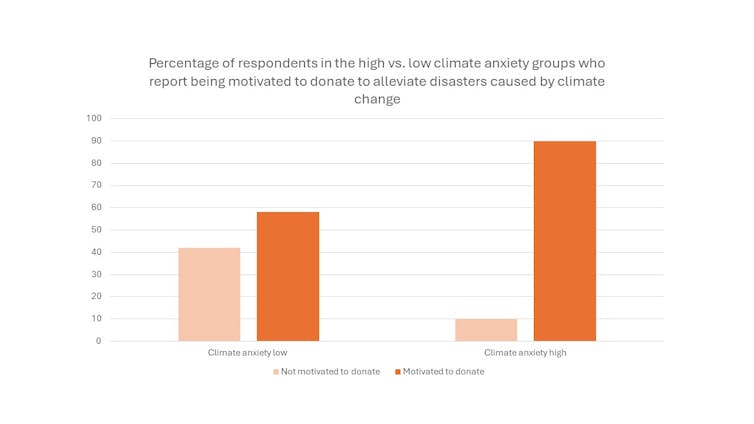
Climate anxiety is becoming more and more widespread. Taking direct positive action can help you cope with your eco-anxiety while helping to address the climate emergency.
Climate anxiety is not a pathology but a healthy response to a real threat. Inaction is related to feeling powerless whereas action is about taking control.
My team of social psychologists recently surveyed over 1,200 people in collaboration with charity GlobalGiving UK. This research focused on eco-anxiety and other drivers of donations to provide disaster relief for climate-related disasters.
We found that younger people reported higher levels of eco-anxiety: people under 30 were four times more likely to report climate anxiety than those over 50. These results tally with another study which also found that younger people and children in particular are bearing the emotional burden of climate change.
Many young people are experiencing the threat to our planet on a personal, visceral level. In addition, our survey found that women were more likely to experience climate anxiety than men, and taken together it was particularly young women who were most anxious.
Our results also found that respondents experiencing high levels of climate anxiety were more likely to want to donate to disasters caused by climate change.

Although climate anxiety can motivate people to want to alleviate the effects of climate change – which is clearly a good thing – the experience of anxiety is often deeply unpleasant. Many people struggling with climate fears wonder how to manage those emotions.
Traditional approaches for managing anxiety emphasise physical activity, breathing and meditation, distraction and spending time in nature, and therapy and medication. They see anxiety as a pathological condition that requires treatment, rather than a healthy emotional response to a real global threat. Although traditional treatments for anxiety might reduce distress for individuals, they do nothing to address the climate emergency.
Taking positive action is good for defending yourself against debilitating anxiety, as demonstrated by research about a practice known as acceptance commitment therapy. While you can’t solve the climate crisis alone, you can join forces with others to build a powerful movement and engage in emotionally intelligent change making.
So, if you want to act but don’t know where to start, here are three ways to make a tangible positive impact while helping to manage your anxiety:
1. Donate to climate charities
You can channel your anxiety into action by helping those impacted by climate-related disasters, for example through donating to climate-related causes.
Small actions are empowering both for you and those who benefit from your generosity. Evidence suggests that helping others is good for your own wellbeing. Helping people who are being directly affected by climate change, by donating to disaster relief for example, can make a positive difference to others while at the same time boosting your own wellbeing.
Select a climate-related project that resonates with you and ensures your contribution reaches those at the forefront of the climate crisis. Some of the organisations doing important climate-related work within their communities include a Brazilian forest conservation project called Iracambi, Greek permaculture iniatives at the Sporos Regeneration Institute and Scotland’s seagrass restoration charity, Seawilding.
2. Make environment top priority at work
Advocate for positive climate action more widely. Let your employer know that you and your colleagues expect them to have a strong environment, social and governance (ESG) agenda. ESG refers to a company’s commitment to do more than make a profit, to actively strive to contribute to environmental and social causes and to conduct business in an ethical and responsible way that adds to society.
Business goals of profit making and goals of acting responsibly are not always well aligned. Employees pushing for the importance of ESG can incentivise companies to not prioritise profit over environmental impact. Our study showed that more than 50% of respondents wanted employers to address climate change. This figure rose to 73% in under 30s, but there’s still scope for more people to call for employers to engage with climate issues.
A demand from employees for climate action forces those companies to act on climate change. Advocacy can not only encourage corporate action against climate change, it’s also empowering. Research highlights that working for an organisation with a shared sense of purpose and identity can be a huge boon to your own wellbeing.
3. Share your worries and amplify solutions
Amplify your mission by talking to others about your climate-related worries. Sharing worries is a powerful tool for managing them. Sharing concerns can help you find others who have similar fears, which will ease the pressure. There is comfort in community, solidarity and in knowing that you are not alone with your worries.
This might entail simply having frank conversations about your fears with family and friends, or it can involve joining a network or actions organised by groups such as the Climate Psychology Alliance or the Climate Coalition.
Combining forces with like-minded people is essential for coordinated action that addresses climate issues. Those same tangible steps that help create a more resilient, interconnected world can also provide comfort and help alleviate anxieties.

Don’t have time to read about climate change as much as you’d like?
Get a weekly roundup in your inbox instead. Every Wednesday, The Conversation’s environment editor writes Imagine, a short email that goes a little deeper into just one climate issue. Join the 30,000+ readers who’ve subscribed so far.
Hanna Zagefka collaborated with the nonprofit GlobalGiving UK in conducting this study on drivers of donations to climate-related disaster relief, providing pro-bono advice on study design, data collection, data analysis and interpretation of the results.
This article was originally published on The Conversation. Read the original article.







